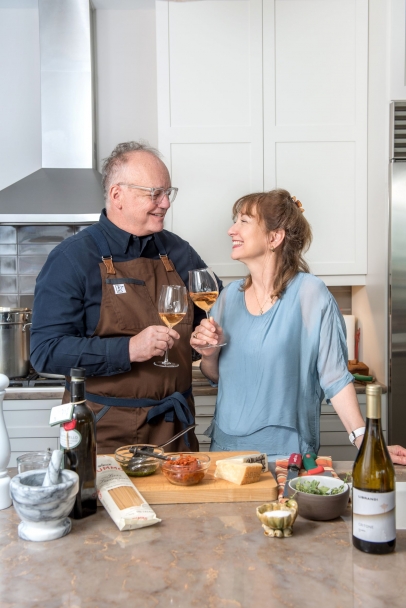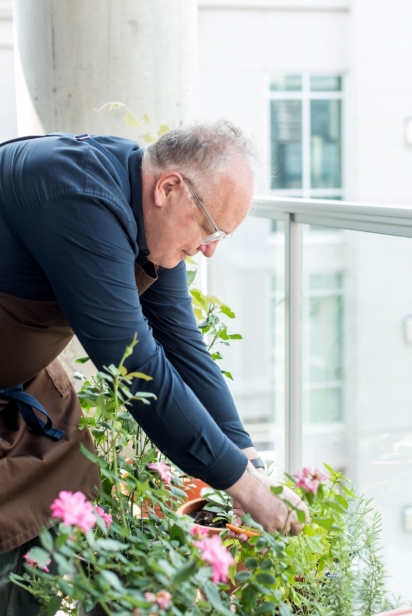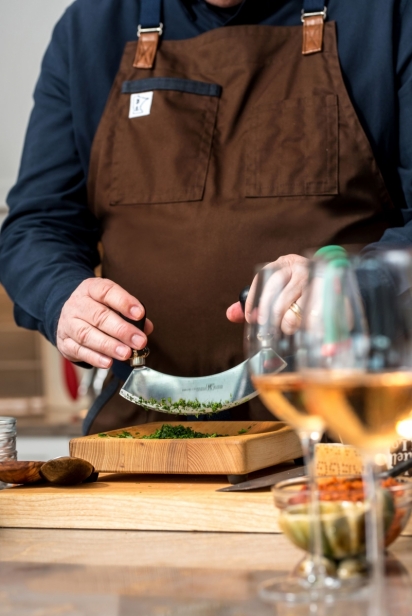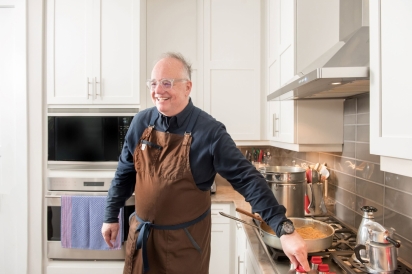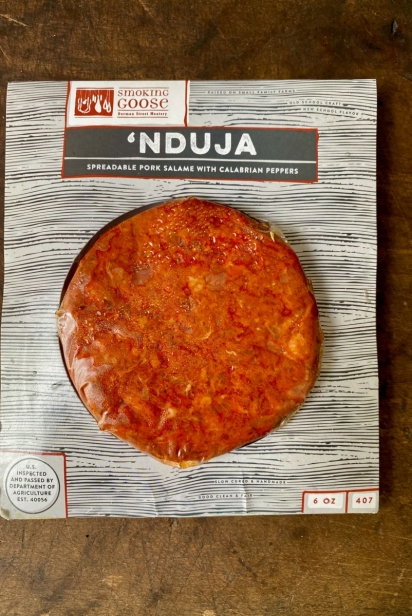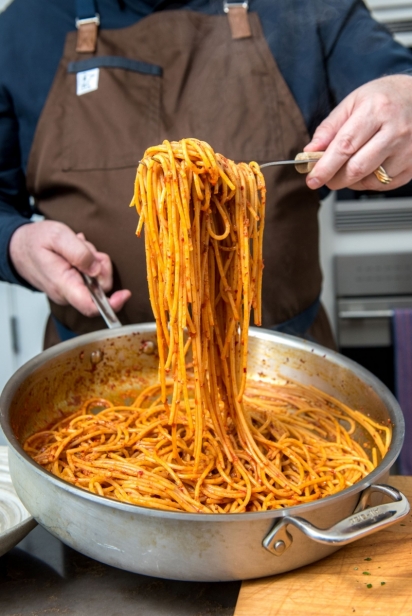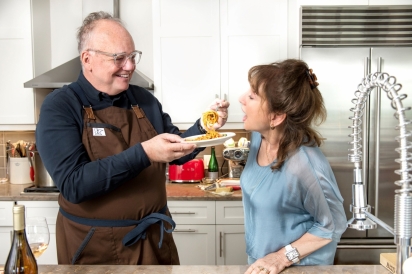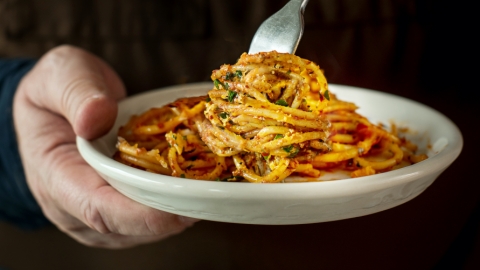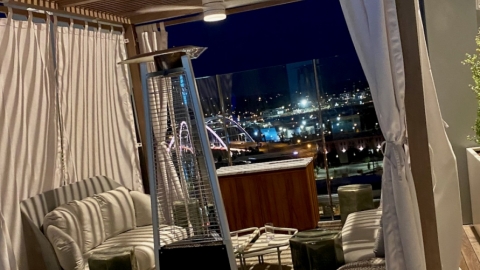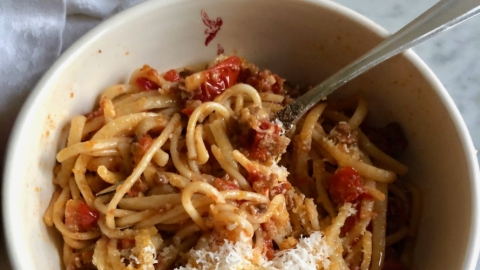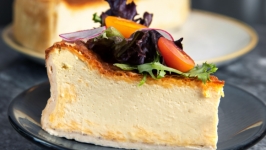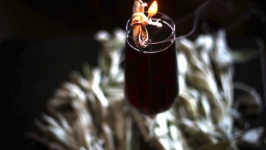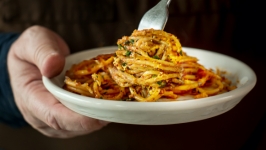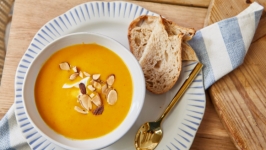Cook Like Italians with the Mantuanos
The night before I was welcomed into the home of Tony and Cathy Mantuano, chef/partners of Yolan at The Joseph in downtown Nasvhille, Tony made a “practice pound” of pasta. In addition to his James Beard Award and the Michelin star he’s received every year for the past ten years, Tony is widely regarded (and rightfully so) as having helped pave the way for Italian cuisine in America. Along with wife Cathy, no slouch herself with a breadth of wine knowledge widely unmatched and internationally recognized service expertise, they are straight up culinary forces and a true gift to the Nashville food scene. All that to say, Tony could cook pasta upside down, blindfolded, and using only his toes at this point in his life and yet he practiced, ensuring all was perfect for today. This simple act defines the Mantuanos.
As does the perfect slice of gluten-free olive oil banana bread I’m currently chewing. They are tirelessly gracious; so considerate, it looks effortless. Together, they are magic, akin to Italian cuisine itself.
Their kitchen is bright and alive with their warm hospitality, the feeling of visiting old friends or close family awash over everyone. Tony comes in off the balcony, a handful of herbs freshly trimmed and begins to chop them with a mezzaluna while we gush about Italian cooking.
“Italian food never goes out of fashion,” he says, rocking the elegantly curved knife back and forth. “And I don’t know if it’s because of the whole fashion scene or Italy being this incredible place, but the food is simple. It’s really easy to digest; [Italians use} a lot of fresh produce… Simple simple. That’s the hallmark of Italian food.”
“And they’re smart,” says Cathy, as she places cheese, oil, and a small bowl of salt on the counter. “They always cook with the seasons. Which just makes the food taste better. They’re not making asparagus pasta in the winter when there’s no asparagus around.”
True Italian food is a sublime study in simplicity, where the focus is on one or two ingredients, highlighted at the peak of its quality. No real Italian meal is meant to be overwhelming or overcomplicated.
“People add too many ingredients,” says Tony. “Italy is not about how many ingredients you can put in a dish, it’s how few. We always say, ‘the most important ingredient is the one you leave out.’”
“You say that,” Cathy interjects.
“Ok, what do you say?”
“People put in too much garlic. Americans use WAY too much garlic.”
“Yeah, [there are these recipes] like, ‘We’re gonna do a pasta with 30 garlic cloves!’ Why?? One’s probably fine. In Italy, people don’t cook with a lot of garlic. It’s a misconception about Italy. It’s a misconception [in general] that the more garlic you put in, the better it must be… Even if you’re making a simple dish like spaghetti pomodoro, the garlic goes into the pan, it’s tossed around a little bit, it gets a little color, then you take it out and throw it away.”
Cathy disappears a brief moment and returns in a familiar state – carrying two bottles of wine. “Of course, while we’re cooking, we have a glass of wine – we like to start with sparkling—”
“It’s 10:30! On a Tuesday!” Tony laughs.
Cathy is adorably unfazed as she opens a bottle. “You could put a little wine in this dish if you want. I don’t think you need it, but…” Tony shrugs as he tends to the pasta boiling away on the stove. “I would never put garlic with ‘nduja because it’s too strong of a flavor. I don’t think it does anything for it.”
Ah, ‘nduja. The aroma in the kitchen is now thick with its rich aroma. Tony swirls it around in some olive oil in a pan, melting it down to create a luxurious “sauce.” ‘Nduja is a Calabrian signature, just one more beautiful thing to come out of a land where the soil is ideal for all sorts of fruits, vegetables, and wine. “My grandparents are from Calabria and a few visits ago, there was a guy named Luigi and he’s the king of ‘nduja,” Tony smiles. “He grows these chili peppers which are pretty spicy, but not incredibly. When he harvests them, he lays them out on a net in the sun to dry, and they get a fermented taste to them, almost like a Chinese pepper. And then he grinds them with pork belly. It’s ( the nduja) spreadable salami, basically.”
“But if you have ‘nduja and it’s hot hot, it’s not right. It’s supposed to be hot and sweet,” Cathy points out. “It’s supposed to be balanced, not just burn your mouth.”
Back to the pasta. I take the opportunity to ask Tony about proper pasta cookery. “One of the biggest mistakes is when people cook pasta, they always overcook it,” he says as he stirs. “[If you] follow the directions on the box or the bag and it says 11 minutes, it’s usually overcooked by the time it makes it to the table, because it continues to cook. If it says 11 minutes, I’ll cook it 8. And then I’ll toss it in the sauce – that’s the other mistake people make is they don’t toss the pasta IN the sauce.”
Cathy nods heavily in agreement. “It’s so sad. And then there’s all this water that ends up pooling around the pasta and you’ve got watery sauce and mushy pasta.”
“And then of course if you cut your pasta, we can probably never be friends! Unless you’re below 5 years old.”
“Well, that’s good you don’t discriminate against children.”
Just as I’m leaning over the ‘nduja pan, marveling at how simple the sauce came together with just two ingredients, Tony ladles a steaming scoop of water out of the pasta pot and into the pan. “One of the things we always preach is that the magic ingredient in a successful pasta dish is a little pasta water in your sauce. It makes it creamy.”
“All the stuff grandma would do and just wouldn’t tell you,” says Cathy.
Conversation shifts into excited oos and aahs as the pair pile the pasta onto a beautiful platter, dancing a well-known “plating” dance, one adding cheese, one topping with herbs and more olive oil, never once getting in the other’s way. And as we all gather around to grab a plate, I start to think of how excited I am to make some pasta at home – cooking it less than the package instructs, adding a little pasta water to the sauce, and opening that bottle of wine. No matter what time it is.


